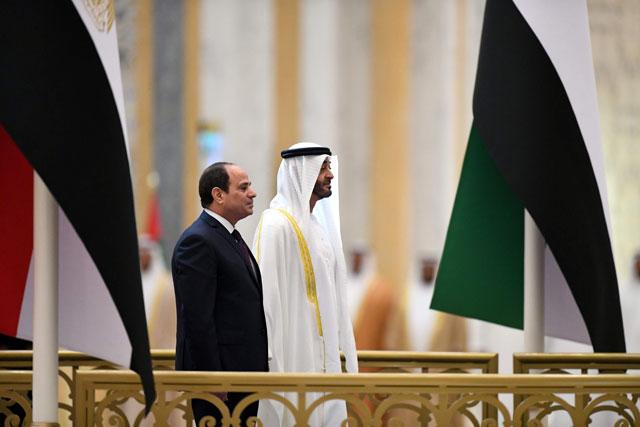You are here
UAE, Egypt launch $20b joint investment programme — official
By AFP - Nov 14,2019 - Last updated at Nov 14,2019

Egyptian President Abdel Fattah Al Sisi and the Crown Prince of Abu Dhabi Sheikh Mohamed Bin Zayed Al Nahyan attend a welcome ceremony in the Emirati capital's Al Watan presidential palace, on Thursday, in Abu Dhabi (AFP photo)
ABU DHABI — The United Arab Emirates and Egypt launched a $20 billion joint investment programme on Thursday to develop "economic and social projects".
Abu Dhabi Crown Prince Sheikh Mohammed Bin Zayed Al Nahyan made the announcement during a visit to the Emirati capital by Egyptian President Abdel Fattah Al Sisi.
"We launched a joint strategic investment platform between the UAE and Egypt worth $20 billion to implement vital economic and social projects for our brotherly countries," Sheikh Mohammed said in a tweet.
He added that he discussed with Sisi ways to strengthen relations and enhance coordination.
The UAE has been a firm regional backer of the Egyptian president. The UAE and Egypt are also part of a Saudi-led alliance that cut relations with Qatar in June 2017, accusing it of bankrolling extremist groups and of being too close to regional rival Iran. Doha denied the accusations.
Cairo has been seeking investment to boost its sagging economy and create jobs.
Poor and middle-class Egyptians have been bearing the brunt of harsh austerity measures since 2016 when the government secured a $12-billion bailout from the International Monetary Fund in exchange for tough economic reforms.
Nearly one in three Egyptians live below the poverty line, according to official figures released in July.
The reforms have met with some pushback, fuelled by allegations of graft among the political and military elite.
Egypt's economy took a battering in the immediate aftermath of the revolution that toppled longtime autocrat Hosni Mubarak in 2011.
Direct foreign investment has grown to record levels in recent years, but the national debt has ballooned since the pound was floated in November 2016, leading to a sharp depreciation.
Related Articles
Oil-rich Abu Dhabi and the United Arab Emirates (UAE) central bank agreed Sunday to roll over $20 billion in loans to neighbouring debt-laden Dubai after it was hit by the 2009 global financial crisis.
DEAD SEA — Jordan on Friday showcased available promising investment opportunities worth $20 billion. The announcement of the opportuni
AMMAN — The total foreign reserves at the Central Bank of Jordan (CBJ), including gold and Special Drawing Rights (SDRs), increased by $2.11
















